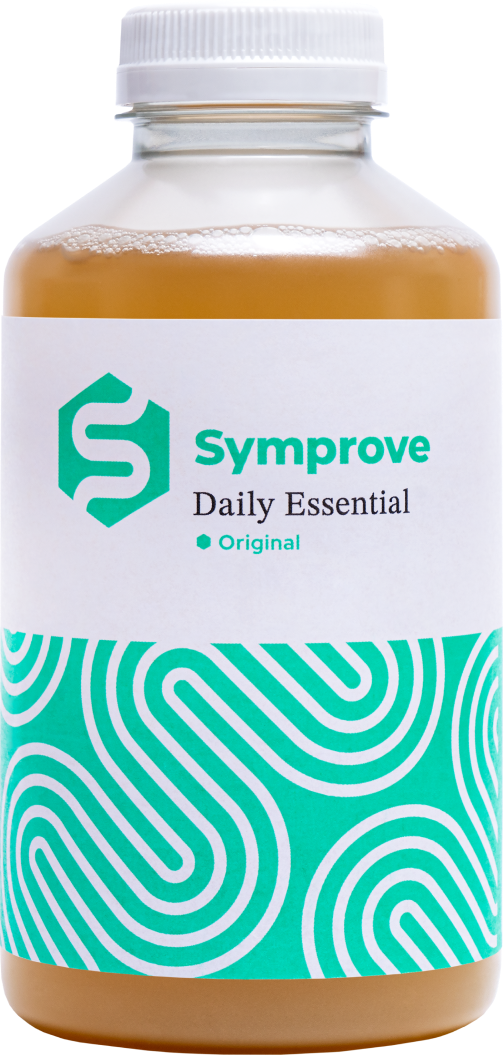Immunologist, Dr. Jenna Macciochi has spent her life exploring the complexities of our immune system and published her first book about the immune system in 2020. An immunology lecturer and researcher at the University of Sussex, she is Chair of several degree programmes, editor of a scientific journal and a member of the University Senate. Jenna shares accessible, science-backed information on how we can take care of our critical defence against ill-health and disease on social media, her health and wellbeing platform and in national publications.
Hi Jenna, thanks so much for chatting with us today and helping us to celebrate world microbiome day. I want to start by asking, could you briefly explain how the gut interacts with the immune system?
The immune system is the system that protects us and keeps us well. It’s comprised of our white blood cells (leukocytes) but also includes the physical barriers to our bodies such as skin, airways and gut, as well as the microbial communities that live on them. By far the biggest community of microbes is in our gut (the large intestine) which is home to trillions of these helpful microorganisms, collectively called our gut microbiome. Did you know that an impressive 70 percent of your immune system is also housed in your gut? Right alongside our gut microbiome.
Our gut microbiome and immune cells are in constant communication and it’s our gut microbiome that trains our immune system from birth. A more diverse gut microbiome essentially means better coaching of your immune cells. In fact, without your gut microbes, our immunity would be pretty inefficient. This means when you look after your gut, you are also helping to support your immune system.
Are there known pathways that involve cross-talk between the gut and immune system?
Yes, there are multiple lines of communication. The presence of a healthy microbiome in the gut actually acts as a type of immune defence by out competing with pathogens that may enter our digestive tract.
Then there is role played by our gut microbiome in digesting our food and ensuring that nutrition is available to us. This indirectly supports our immune system which depends on a healthy supply of nutrients. In particular, when we digest fibre our gut microbes produce a range of metabolites including short chain fatty acids which have enormous immune-balancing potential. They are absorbed into our bloodstream meaning they can exert an effect on immune cells all over our body, not just in the gut.
Our gut microbes also directly communicate with the gut immune cells (colonocytes) as they are located close to each other. This provides a form of education, helping immune cells know what they should and shouldn’t respond to.
Can you give us a specific example of where microbes or microbial derived products can alter our immune response?
Adding to the example above, butyrate, acetate and propionate are three important short-chain fatty acids (SCFAs) produced in the human gut when our microbes digest food fibres. They have been shown to have significant immune system effects by inducing the differentiation of T-regulatory cells (Tregs). They do this by directly affecting what genes are switched on and off within the T cells – known as epigenetics (above genetics). Tregs are like the wardens of the immune system, shutting down inflammation and unnecessary immune responses (e.g., allergies).
We often hear people talking about “boosting” their immune system. What are your thoughts on this phrase?
We often talk about ‘boosting’ the immune system, likening it to a switch that we want to turn on to fight illness or infection. But it’s often forgotten that the immune response can be damaging to our own tissues. For example, inflammation is designed to remove pathogens but also causes lots of unpleasant symptoms, if sustained. This is why half of our immune system is designed to turn the other half off. Rather than boosting we want to be balancing. We can do this by focusing on an anti-inflammatory diet (i.e. a Mediterranean-style diet) and lifestyle, caring for our gut and feeding our gut microbiome so they produce metabolites such as SCFAs which nurture T-reg cells to regulate against unnecessary immune responses that cause health issues such as allergies and autoimmune conditions.
Can you explain what is meant by the term immunonutrition?
Immunonutrition is the clinical term given to the potential to modulate the activity of the immune system by interventions with specific nutrients (e.g. vitamin C, vitamin D, omega 3 fatty acids). It is a term that was originally used to improve the health of people who are critically ill or recovering from major surgery. This concept may be applied to any situation in which an altered supply of nutrients is used to modify inflammatory or immune responses. Some of the key nutrients know to play a role include beta-glucans (found in wholegrains such as barley and oats, some types of seaweed and mushrooms) and sufficient omega 3 fats which can help turn off unnecessary inflammation.
There’s a chapter in your recent book, ‘Immunity: The Science of Staying Well’, titled ‘Immunity-nourishing Nutrition’, what are the key dietary factors needed to nourish the immune system?
Much of the nutritional conversations around the immune system sadly still focus on supplements as quick fixes and the legacy of taking vitamin C as all we need. But the immune system is incredibly complex as are its nutritional needs. This largely stems from the monetization and marketing of food, in part, but also from years of conflicting information from health information sources. A lot of these nutrition conversations focus on the disagreements and details that don’t really make a whole lot of difference when you look at the bigger picture – the overall diet pattern.
Dietary patterns are defined as combining the quantities, proportions, variety, or combination of different beneficial properties of foods and drinks into the diet, and the frequency with which they are habitually consumed. Simply put, it means you are mostly eating whole foods and minimising ultra-processed foods, avoiding key vitamin and mineral deficiencies and eating adequate protein and healthy fats. But a healthy diet pattern must also be one you can sustain in the long term. This is because context is important: the best diet for your immune system also depends on your physiology, genetics, food preferences, age, health, budget, cooking skills and personal beliefs and preferences. One of the most well researched is the Mediterranean style diet due to its anti-inflammatory properties, but any traditional diet pattern tends to also have health benefits. This is what I would encourage everyone to focus on. That and plant diversity to fertilise your gut with lots of fibre.
Using one dietary factor as an example, can you briefly explain the mechanism of how this factor nourishes the immune system?
In addition to the example of SCFAs, another good example is omega 3 fats. These are called essential fats because you can’t live without them, and your body doesn’t have the ability to naturally make them. Omega-3’s are polyunsaturated fats with a known protective function in the immune system. They keep the membranes of our immune cells nice and flexible which support them in doing their job. They are also the precursors to resolving inflammation, healing and repair. The most bioavailable omega 3’s is found in oily fish (EPA and DHA). They are also found in certain nuts (e.g walnuts) and seeds (e.g. flaxseeds) in the form of ALA, although with a much-reduced bioavailability. If you are not regularly eating oily fish then it may be recommended that you supplement with omega 3’s.
Are there any naturally probiotic containing foods which can nurture our immune systems?
Probiotics are live microorganisms that when consumed have benefits on our health. Although we often think of probiotics as coming from a pill, several foods are actually sources of these beneficial live microorganisms including yoghurt, kefir, kombucha, sauerkraut and other types of pickles like kimchi, tempeh a fermented soyabean product, miso which is a Japanese seasoning, Natto which is also a fermented soyabean product and certain types of cheese like parmesan, gouda and mozzarella. Just look for non-pasteurised versions (pasteurisation kills the live microorganisms).
Are there any non-food components that impact the gut’s interaction with the immune system?
I’d say one influence is at the level of the nervous system. At a biochemical level, it’s very complex and difficult to pinpoint all the mechanisms as these are still being worked out. There are a huge number of nerve cells in the gut (called the Enteric Nervous System) and other immune organs like the lymph nodes which are strategically placed throughout the body. Certain cells of the immune system have receptors that respond the release of neurochemicals and neurohormones. This is an example of how the brain and our thoughts and feelings can directly a translate to our immune cells and change their actions. On the flip side, your immune cells can produce chemicals called cytokines that can directly change our behaviours by acting on our brain and nervous system. So there is communication both ways.
Can you explain the link between ‘leaky gut’ and the immune system?
We have developed a very complicated and highly specialised digestive system. Our digestive tract is delicate, a fragile barrier that is just one cell thick! This anatomical set-up is deliberate, maximising digestion and the absorption of nutrients from our food. Although we think of our digestive tract as inside us, it actually forms the largest interface of our body with the outside world. As you can imagine, it’s a constant challenge to keep this delicate barrier in order.
Most of the time, the tight junctions between the gut barrier cells are kept tight, separating the gut contents from the rest of the body. But each time we eat, the gut barrier must become transiently permeable. This permits the absorption of essential fluids and nutrients from a meal. It does lead to a transient inflammatory response in the blood, known as post-prandial or dietary inflammation. Now this is normal, natural and under healthy circumstances your body can deal with this very effectively. But it can be exacerbated by certain situations (e.g. low gut microbial diversity, prolonged strenuous exercise, medications, alcohol, undiagnosed health conditions such as Coeliac disease). In these cases, our gut barrier is more permeable or permeable for longer, allowing things from our gut to leak into our bloodstream, including our gut microbiome. These microbes are only our allies if they stay inside the gut, otherwise they can switch on a silent inflammation. Repeated over time, this can trigger a variety of short- and long-term health outcomes. The good news is that studies suggest a diverse and health gut microbiome can provide a protective effect, reducing these negative responses.
As editor of ‘Annals of Advanced Biomedical Sciences’ and an immunology lecturer, you must read a plethora of exciting and cutting-edge research. Can you tell us about a recent publication, related to the gut and immune system which excited you?
I find it fascinating that we are moving towards being able to look at the composition of the gut microbiome as an indication of our disease risk. This has been looked at over the last year of the covid pandemic. Several studies have identified an altered gut microbiome in patients with COVID-19. A deeper look has revealed a preliminary study that the composition of the gut microbiome is the strongest predictor of COVID-19 severity compared to other clinical characteristics that are commonly measured like…
Specifically, the presence of a bacterium in the stool – called Enterococcus faecalis – was a robust predictor of COVID-19 severity. Not surprisingly, Enterococcus faecalis has been associated with chronic inflammation.
We can link this back to the T-reg cells mentioned earlier because another recent study has shown that SARS-CoV-2 infection triggers an imbalance T regulatory cells and this lack of immune balance that puts us at bigger risk for severe infection. Bacteria from the gut microbiome are responsible for the proper activation of those T-regulatory cells and this might be one way that altered gut microbiome contributors to disease severity.
References
- Lambring CB, Siraj S, Patel K, Sankpal UT, Mathew S, Basha R. Impact of the Microbiome on the Immune System. Crit Rev Immunol. 2019;39(5):313-328. doi:10.1615/CritRevImmunol.2019033233.
- Ratajczak W, Rył A, Mizerski A, Walczakiewicz K, Sipak O, Laszczyńska M. Immunomodulatory potential of gut microbiome-derived short-chain fatty acids (SCFAs). Acta Biochim Pol. 2019 Mar 4;66(1):1-12. doi: 10.18388/abp.2018_2648. PMID: 30831575.
- Smith PM, Howitt MR, Panikov N, Michaud M, Gallini CA, Bohlooly-Y M, Glickman JN, Garrett WS. The microbial metabolites, short-chain fatty acids, regulate colonic Treg cell homeostasis. Science. 2013 Aug 2;341(6145):569-73. doi: 10.1126/science.1241165. Epub 2013 Jul 4. PMID: 23828891; PMCID: PMC3807819.
- Casas R, Sacanella E, Estruch R. The immune protective effect of the Mediterranean diet against chronic low-grade inflammatory diseases. Endocr Metab Immune Disord Drug Targets. 2014;14(4):245-54. doi: 10.2174/1871530314666140922153350. PMID: 25244229; PMCID: PMC4443792.
- Grimble RF. Immunonutrition. Curr Opin Gastroenterol. 2005 Mar;21(2):216-22. doi: 10.1097/01.mog.0000153360.90653.82. PMID: 15711216.
- Berry SE, Valdes AM, Drew DA, Asnicar F, Mazidi M, Wolf J, Capdevila J, Hadjigeorgiou G, Davies R, Al Khatib H, Bonnett C, Ganesh S, Bakker E, Hart D, Mangino M, Merino J, Linenberg I, Wyatt P, Ordovas JM, Gardner CD, Delahanty LM, Chan AT, Segata N, Franks PW, Spector TD. Human postprandial responses to food and potential for precision nutrition. Nat Med. 2020 Jun;26(6):964-973. doi: 10.1038/s41591-020-0934-0. Epub 2020 Jun 11. Erratum in: Nat Med. 2020 Nov;26(11):1802. PMID: 32528151.
- Nagpal R, Yadav H. Bacterial Translocation from the Gut to the Distant Organs: An Overview. Ann Nutr Metab. 2017;71 Suppl 1:11-16. doi: 10.1159/000479918. Epub 2017 Sep 28. PMID: 28950279.
- Doyle V. Ward, Shakti Bhattarai, Mayra Rojas-Correa, Ayan Purkayastha, Devon Holler, Ming Da Qu, William G. Mitchell, Jason Yang, Samuel Fountain, Abigail Zeamer, Catherine Forconi, Gavin Fujimori, Boaz Odwar, Caitlin Cawley, Beth A. McCormick, Ann Moormann, Mireya Wessolossky, Vanni Bucci, Ana Maldonado-Contreras. THE INTESTINAL AND ORAL MICROBIOMES ARE ROBUST PREDICTORS OF COVID-19 SEVERITY THE MAIN PREDICTOR OF COVID-19-RELATED FATALITY. doi: https://doi.org/10.1101/2021.01.05.20249061.
- Silvia Galván-Peña, Juliette Leon, Kaitavjeet Chowdhary, Daniel A. Michelson, Brinda Vijaykumar, Liang Yang, Angela Magnuson, Zachary Manickas-Hill, Alicja Piechocka-Trocha, Daniel P. Worrall, Kathryn E. Hall, Musie Ghebremichael, Bruce D. Walker, Jonathan Z. Li, Xu G. Yu, MGH COVID-19 Collection & Processing Team, Diane Mathis, Christophe Benoist. Profound Treg perturbations correlate with COVID-19 severity. doi: https://doi.org/10.1101/2020.12.11.416180.
- Stein et al. Computer-guided design of optimal microbial consortia for immune system modulation. eLife 2018;7:e30916. DOI: 10.7554/eLife.30916.
- Villapol, S. Gastrointestinal symptoms associated with COVID-19: impact on the gut microbiome. DOI: https://doi.org/10.1016/j.trsl.2020.08.004.



